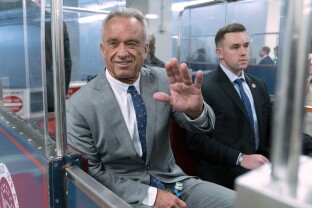The Senate voted early Thursday morning to confirm Robert F. Kennedy Jr. as the next secretary of the Department of Health and Human Services, granting him sweeping authority over a U.S. health system he has long antagonized.
The vote was 52-48, nearly split along party lines. Sen. Mitch McConnell voted against Kennedy, after voting to advance his nomination on Wednesday.
His confirmation culminates a stunning rise to public health power for the nominee, the son of former Sen. Robert F. Kennedy and nephew of former President John F. Kennedy Jr.
It also signals a new era for the role of the federal health system in the U.S., which President Donald Trump has already begun to reshape with executive orders and Department of Government Efficiency directives. Some of these changes, like withdrawing the U.S. from the World Health Organization and restricting communications between public health agencies and the public, have been met with fierce opposition from the scientific establishment.
But Kennedy spent much of his time before Senate committees assuring lawmakers that he wouldn’t go too crazy on the changes.
“I support the CDC,” Kennedy said in response to questions during his confirmation hearing about past comments comparing the agency to death camps. “My job is to empower the scientists.”
In speeches before the vote, senators from each party epitomized the split over Kennedy’s confirmation. “He will bring a fresh perspective to health care,” said Republican Sen. Mike Crapo. “On issue after issue, Mr. Kennedy has demonstrated a profound lack of knowledge at best, and deeply dangerous views at worst,” said Democratic Sen. Ron Wyden.
Kennedy’s path to the position was winding and would have been shocking just a year ago. A longtime anti-vaccine advocate, Kennedy ran for president in 2024, first as a Democrat and then as an independent, before ultimately ending his campaign to back Trump.
Trump floated the possibility of giving Kennedy a significant role in his administration even before Kennedy officially endorsed him. And when asked by a reporter if Senate confirmation for a former Democrat could be a problem, Trump brushed it off. “I like smart people,” he told CNN in August. “And Republicans like me.”
The president has also been clear that he intended to give Kennedy a broad purview on health policy. “I’m gonna let him go wild on health,” Trump told supporters near the end of his campaign last year. “I’m gonna let him go wild on the food. I’m gonna let him go wild on medicines.”
The prospect of Kennedy rampaging through the U.S. public health system worried some Republican senators, including Sen. Bill Cassidy, chair of the HELP committee and a physician. He agreed to vote for Kennedy after a series of “intense conversations” with the nominee, during which Kennedy agreed to a number of stipulations that would give Cassidy unprecedented sway over decision-making at HHS.
But when asked Thursday how he would actually enforce his stipulations, Cassidy emphasized that he wants to have a relationship with Kennedy that is “collaborative and not antagonistic.”
“I don’t mean to be cheeky, but you know the process here,” said Cassidy. “Committee chairs have oversight capability, right? So just the normal function of how we work allows that interaction.”
McConnell, in a statement after the vote, said he rejected Kennedy over his “record of trafficking in dangerous conspiracy theories,” especially on vaccine safety.
“I’m a survivor of childhood polio,” he wrote. “In my lifetime, I’ve watched vaccines save millions of lives from devastating diseases across America and around the world. I will not condone the re-litigation of proven cures, and neither will millions of Americans who credit their survival and quality of life to scientific miracles.”
In a sign of Kennedy’s full pivot away from the Democratic Party — and the legacy of his family — no Democrats voted for Kennedy’s confirmation. Trump has also sought to dismantle USAID, the agency that former President Kennedy created to offer health aid to foreign countries.
Kennedy will need to hit the ground running in his new role. Even aside from meeting Trump’s priorities for public health, Kennedy will face an ongoing H5N1 outbreak and record-low levels of public trust in the health agencies.
He will also need to get the other health nominees confirmed. The nominees for the public health agencies under HHS include Marty Makary for commissioner of the Food and Drug Administration, Jay Bhattacharya for head of the National Institutes of Health, Dave Weldon for director of the Centers for Disease Control and Prevention and Mehmet Oz for head of the Centers for Medicare and Medicaid Services.
None of the other nominees has hearings scheduled so far. Oz and Bhattacharya have been seen around Capitol Hill, potentially meeting with senators to drum up support.
Cassidy said that he’d met with Makary, and that their meeting “went very well.” He said he hadn’t yet met with Weldon in an official capacity.
But the new secretary is nothing if not confident.
“Should I be so privileged as to be confirmed, we will make sure our tax dollars support healthy foods,” Kennedy said during his opening statement to the HELP committee. “We will scrutinize the chemical additives in our food supply. We will remove the financial conflicts of interest in our agencies. We will create an honest, unbiased, science-driven HHS, accountable to the president, to Congress and to the American people. We will reverse the chronic disease epidemic and put the nation back on the road to health.”
—
Margaret Manto is a NOTUS reporter and an Allbritton Journalism Institute fellow.
Sign in
Log into your free account with your email. Don’t have one?
Check your email for a one-time code.
We sent a 4-digit code to . Enter the pin to confirm your account.
New code will be available in 1:00
Let’s try this again.
We encountered an error with the passcode sent to . Please reenter your email.


